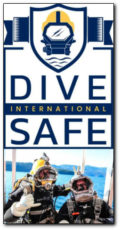Do We Need More Occupational Divers?
By CADC Admin ~ February 7th, 2022. Filed under: CADC MAG, EDUCATION, JOBS.
Do We Need More Occupational Divers?
By David Parkes, CEO, Diver Certification Board of Canada
Over the past few months, I’ve spoken to many contractors who tell me that they can’t find enough occupational divers to meet their requirements. These contractors aren’t in one specific area of Canada, but rather span from coast to coast. Since speaking to the contractors, I’ve spoken to various dive schools and provincial regulators to try and gain an understanding as to why there is a shortage. I’ve been told there are many reasons.
Although we graduate approximately 130 new divers every year in Canada, not all of them stay in the industry. Some try it for a while and then leave to find a less onerous job—one that doesn’t require them to work at all hours of the day in cold or dark conditions. Some get married and then go looking for a job that will allow them to come home for dinner in the evening—every evening. Some feel they aren’t paid enough, given the availability of other trades requiring similar skills.
Not all contractors treat their employees as well as they might. Word gets around, and schools may be hesitant to recommend them to their graduates. But even contractors with good reputations have difficulty attracting and retaining all of the divers they need. Is it just the nature of the beast? When young people look at diving, do they see a romantic, challenging job that attracts them to the dive school, only to discover, upon graduation, that working as a diver often means moving away from home and working long hours for days, or even weeks, at a stretch?
It’s difficult to calculate the attrition of new divers in Canada; however, the Diver Certification Board of Canada (DCBC) is probably the only organization in Canada that has a historical database with sufficient information to try to make that calculation.
To prove that thesis, we took the statistics available to us in the years from 2016 through 2018. During those three years, we certified 402 Canadian dive school graduates, while in the years from 2018 to 2021, we renewed the two-year certificates of only 251 of those
graduates. This seems to indicate we have an attrition rate of 37.5 per cent. However, 50 of the graduates who didn’t renew are from British Columbia, 60 are from Ontario, and 12 are from Quebec, where Rimouski graduates don’t need to keep their DCBC certificate current. If we assume half of those divers are still working, even though their certificates have expired, then the attrition rate falls to 22 per cent.
The situation is far worse in the United States. I discussed the issue of attrition of new divers in the U.S. with Phil Newsum, executive director of the Association of Diving Contractors International (ADCI). Phil is confident that ADCI has an accurate handle on the attrition situation in the U.S., and it isn’t good. Attrition there is in the order of 65 to 70 per cent, i.e., about 70 per cent of dive school graduates leave the industry within two years of graduation, many within six months of graduation.
Phil says there are two main reasons they quit. One reason is that many grads are vets whose training is funded by the federal government; the other is the nature of the job. When someone retires from the armed forces, they’re eligible for about $70,000 worth or training. Assuming diver training costs them about $30,000, they still have lots of training money to burn off. Rather than going to work as a diver immediately after graduation from dive school, they may go on to train as a welder or machinist, just as a back-up career. In such a case, they may follow the newer career, given that working conditions could be considered more conducive to family life. This high rate of attrition, combined with the recent closure of two dive schools, has created a distinct shortage of diving personnel in the US.
Is it possible divers don’t know where the good jobs are? Or that contractors don’t know that good, qualified divers are out there looking for work? Is there a need for a diver-specific jobs website? Or perhaps a rebuild of CADC’s “Underwater Jobs” website? Or do we simply need more occupational divers—or even another dive school?
We’ll take the opportunity to debate this issue on the last day of the Canadian Underwater Conference and Exhibition (CUCE), using the same format we use at every conference. We’ll have a panel discussion involving four or five industry experts who are facilitated by a moderator. Each expert will be given three or four minutes to express their opinion on the subject, followed by questions from the moderator and then questions from the floor. NOTE: CONFERENCE CANCELLED
The bottom line comes down to these questions:
Do we need to make the career more attractive in terms of working conditions and salaries?
Do we need to find a better way to connect contractors who are looking for divers with those divers who are looking for work?
- Do we simply need to graduate more divers?
David Parkes is CEO of the Diver Certification Board of Canada.
(Article is a reprint from the Winter 2021-22 CADC Magazine.)
NOTE: In a response to this situation, CADC – as a supporter – has completely sanctioned a total rebuild of the the UnderwaterJOBS.com website. Check it out for job listings. Registration is free.







